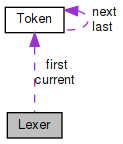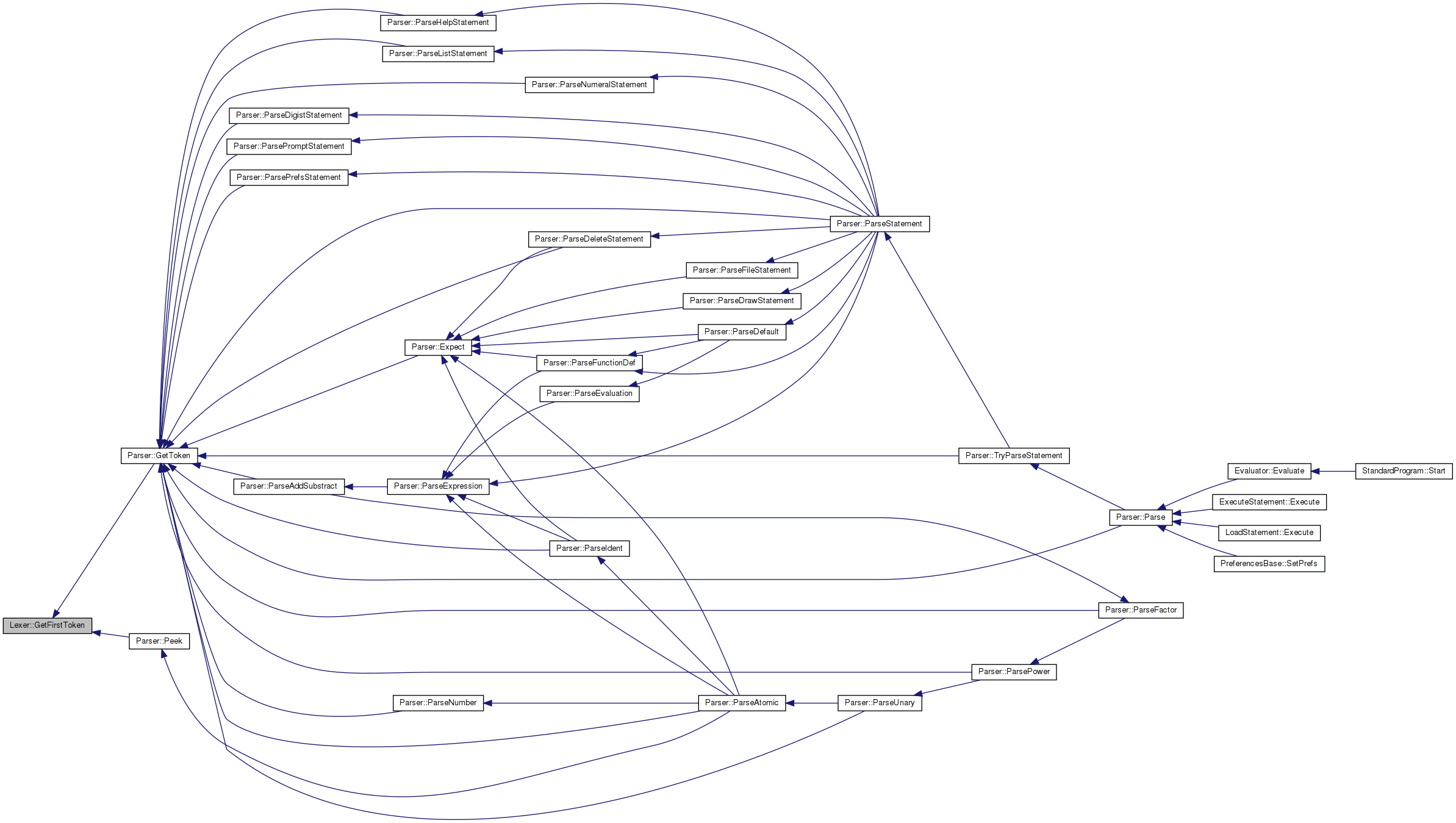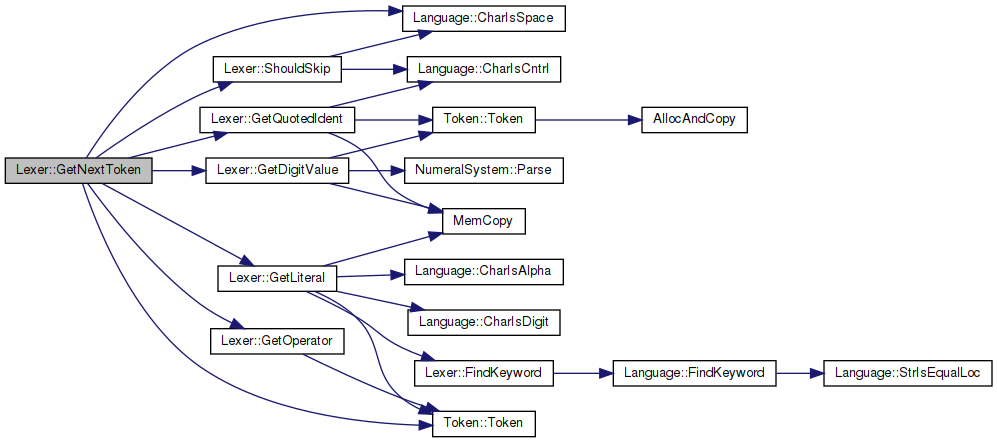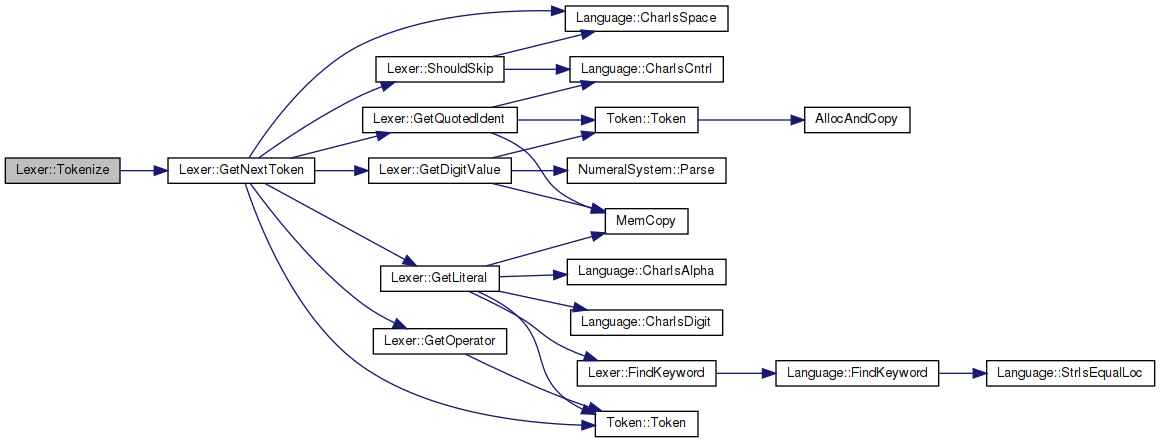Encapsulates an lexical analyzer. Provides token for the parser. More...
#include <lexer.h>

Public Member Functions | |
| Lexer (const char *input) | |
| ~Lexer () | |
| void | Tokenize () |
| Token * | GetFirstToken () const |
| char * | GetInput () const |
Static Public Member Functions | |
| static char * | FindKeyword (Symbol symbol) |
Private Member Functions | |
| void | GetNextToken () |
| bool | GetOperator () |
| bool | GetQuotedIdent () |
| bool | GetLiteral () |
| bool | GetDigitValue () |
Static Private Member Functions | |
| static bool | ShouldSkip (char character) |
| static Symbol | FindKeyword (const char *ident) |
Private Attributes | |
| char * | input |
| char * | str |
| unsigned int | pos |
| Token * | first |
| Token * | current |
Detailed Description
Encapsulates an lexical analyzer. Provides token for the parser.
More info on lexical analysis is available at Wikipedia: https://wikipedia.org/wiki/Lexical_analysis
Constructor & Destructor Documentation
◆ Lexer()
|
explicit |
Definition at line 38 of file lexer.cpp.
References AllocAndCopy(), current, first, input, pos, and str.
Referenced by Parser::Parser().


◆ ~Lexer()
Member Function Documentation
◆ FindKeyword() [1/2]
|
static |
Definition at line 248 of file lexer.cpp.
References operatordef::chr, keywords, keyworddef::name, operators, operatordef::symbol, and keyworddef::symbol.
Referenced by PreferencesBase::GetDescription().

◆ FindKeyword() [2/2]
|
staticprivate |
Definition at line 243 of file lexer.cpp.
References Language::FindKeyword().
Referenced by GetLiteral().


◆ GetDigitValue()
|
private |
Definition at line 216 of file lexer.cpp.
References current, Program::Input, MemCopy(), NumeralSystem::Parse(), pos, str, symnumber, and Token::Token().
Referenced by GetNextToken().


◆ GetFirstToken()
| Token * Lexer::GetFirstToken | ( | ) | const |
Definition at line 62 of file lexer.cpp.
References first.
Referenced by Parser::GetToken(), and Parser::Peek().

◆ GetInput()
| char * Lexer::GetInput | ( | ) | const |
Definition at line 57 of file lexer.cpp.
References input.
Referenced by Parser::Parse(), Parser::ParseDigistStatement(), Parser::ParseFileStatement(), Parser::ParseFunctionDef(), Parser::ParseIdent(), Parser::ParseNumeralStatement(), and Parser::TryParseStatement().

◆ GetLiteral()
|
private |
Definition at line 166 of file lexer.cpp.
References Language::CharIsAlpha(), Language::CharIsDigit(), current, FindKeyword(), MemCopy(), pos, str, symident, and Token::Token().
Referenced by GetNextToken().


◆ GetNextToken()
|
private |
Definition at line 86 of file lexer.cpp.
References Language::CharIsSpace(), current, GetDigitValue(), GetLiteral(), GetOperator(), GetQuotedIdent(), pos, ShouldSkip(), str, symend, symunknown, and Token::Token().
Referenced by Tokenize().


◆ GetOperator()
|
private |
Definition at line 112 of file lexer.cpp.
References operatordef::chr, current, operators, pos, str, operatordef::symbol, and Token::Token().
Referenced by GetNextToken().


◆ GetQuotedIdent()
|
private |
Definition at line 129 of file lexer.cpp.
References Language::CharIsCntrl(), current, MemCopy(), pos, str, symqident, and Token::Token().
Referenced by GetNextToken().


◆ ShouldSkip()
|
staticprivate |
Definition at line 271 of file lexer.cpp.
References Language::CharIsCntrl(), and Language::CharIsSpace().
Referenced by GetNextToken().


◆ Tokenize()
| void Lexer::Tokenize | ( | ) |
Definition at line 67 of file lexer.cpp.
References current, first, GetNextToken(), input, Token::next, pos, str, Token::symbol, and symend.
Referenced by Parser::Parse().


Member Data Documentation
◆ current
|
private |
Definition at line 64 of file lexer.h.
Referenced by GetDigitValue(), GetLiteral(), GetNextToken(), GetOperator(), GetQuotedIdent(), Lexer(), and Tokenize().
◆ first
|
private |
Definition at line 63 of file lexer.h.
Referenced by GetFirstToken(), Lexer(), Tokenize(), and ~Lexer().
◆ input
|
private |
Definition at line 60 of file lexer.h.
Referenced by GetInput(), Lexer(), Tokenize(), and ~Lexer().
◆ pos
|
private |
Definition at line 62 of file lexer.h.
Referenced by GetDigitValue(), GetLiteral(), GetNextToken(), GetOperator(), GetQuotedIdent(), Lexer(), and Tokenize().
◆ str
|
private |
Definition at line 61 of file lexer.h.
Referenced by GetDigitValue(), GetLiteral(), GetNextToken(), GetOperator(), GetQuotedIdent(), Lexer(), and Tokenize().
The documentation for this class was generated from the following files:
